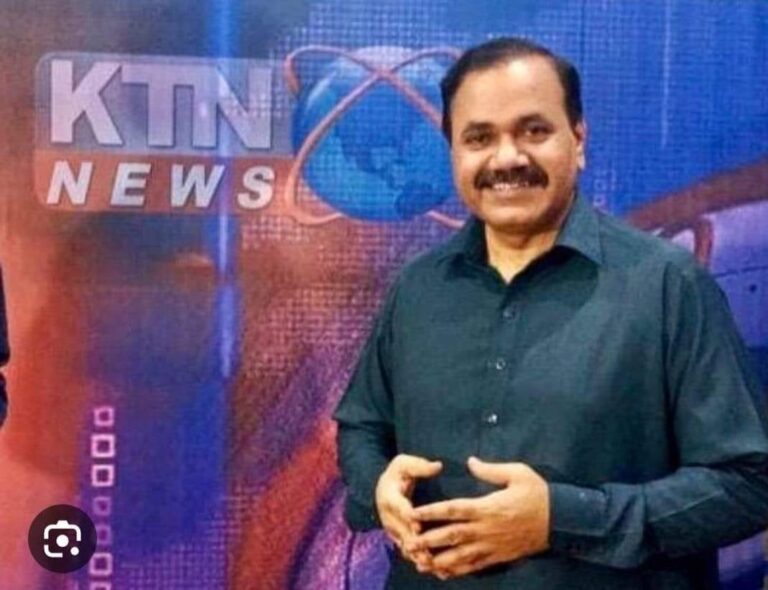Impunity recognizes no boundaries
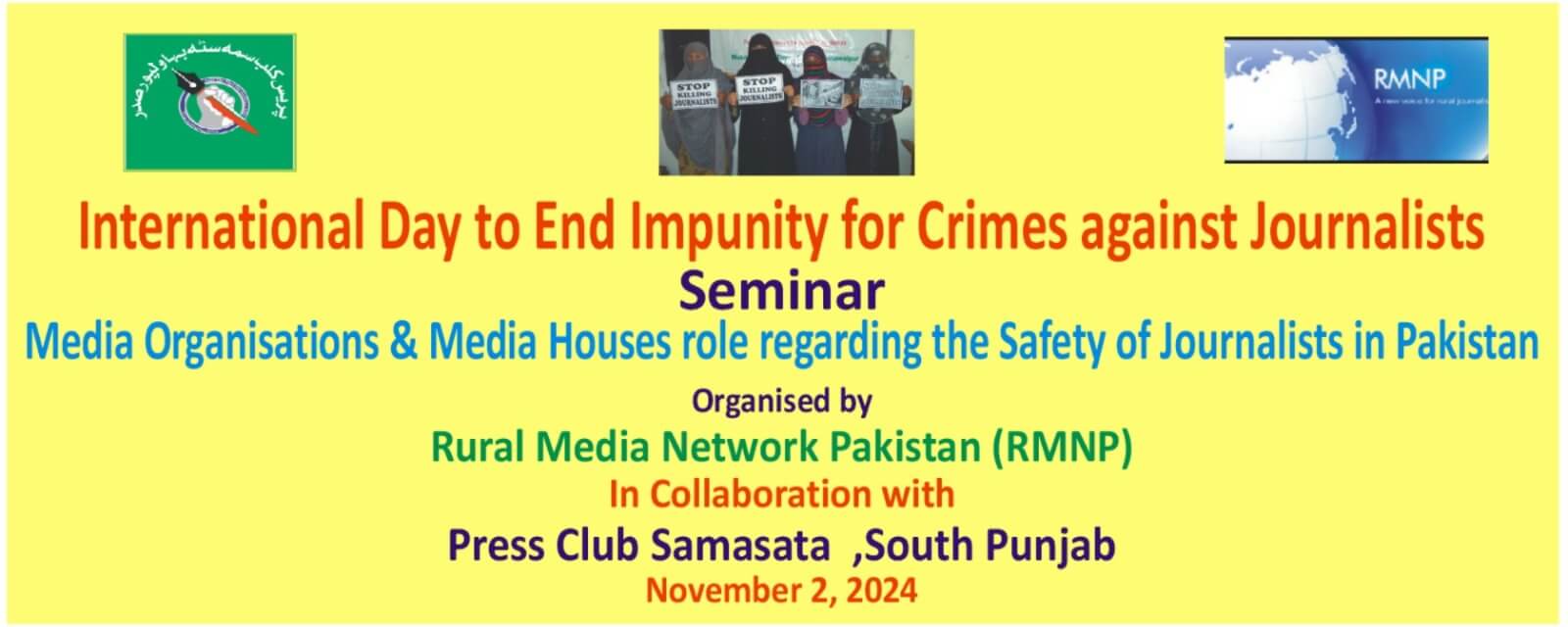
RMNP commemorates International Day to End Impunity for Crimes against Journalists” on 2nd November 2024
Samasata(RMNP) Press freedom & training organization, Rural Media Network Pakistan (RMNP) commemorated “International Day to End Impunity for Crimes against Journalists” on 2nd November 2024 in collaboration with Press Club Samasata South Punjab .
A seminar titled ” Media Houses & Media Organizations role regarding the Safety of Journalists in Pakistan” held in the premises of town hall Samasata.It was chaired by the RMNP President Ehsan Ahmed Sehar while Patron-in-Chief Press Club Samasata Iftikhar Ahmed Alvi acted as moderator. This seminar was attended by correspondents of the print and electronic media, four regional newspapers editors, press club Samasata members, local leaders of different political parties and academics.

RMNP President Ehsan Ahmed Sehar delivering presidential address in seminar titled “” Media Houses & Media Organizations role regarding the Safety of Journalists in Pakistan” held in the premises of town hall Samasata,South Punjab.
RMNP President Ehsan Ahmed Sehar in his presidential address said, the UN General Assembly in its resolution on 18th December 2013 proclaimed 2nd November as IDEI ,a date which commemorates the assassination of two French journalists in Mali on 2nd November 2013.He stated this in 9th IDEI which RMNP is celebrating. Highlighting the prevailing freedom of expression situation in Pakistan, he said that impunity ruled Pakistan during current year where ten journalists including one female have been killed. He said that despite the enactment of ” Protection of Journalists and Media Professionals Act ” three years ago implementation remains weak, and “Safety Commission” required under this act is yet to be established. Threats, harassment, abduction violence enforced disappearances and killing of journalists are rampant, leading to self-censorship. He stated that Pakistani media is polarized like Pakistani society .Pakistani media is urban -oriented ,all media houses and media organizations have their headquarters in big cities so they only care for their major cities based staffers and continuously neglecting their print and electronic media correspondents functioning in districts and small towns of the country. Ehsan stated Punjab Defamation Bill 2024 passed without stakeholders consultations raises concerns as it emphasizes prosecuting public officials and allows fine without proof of actual damage which can lead to repression or intimidation. He demanded the review of defamation provisions and its alignment with international laws.
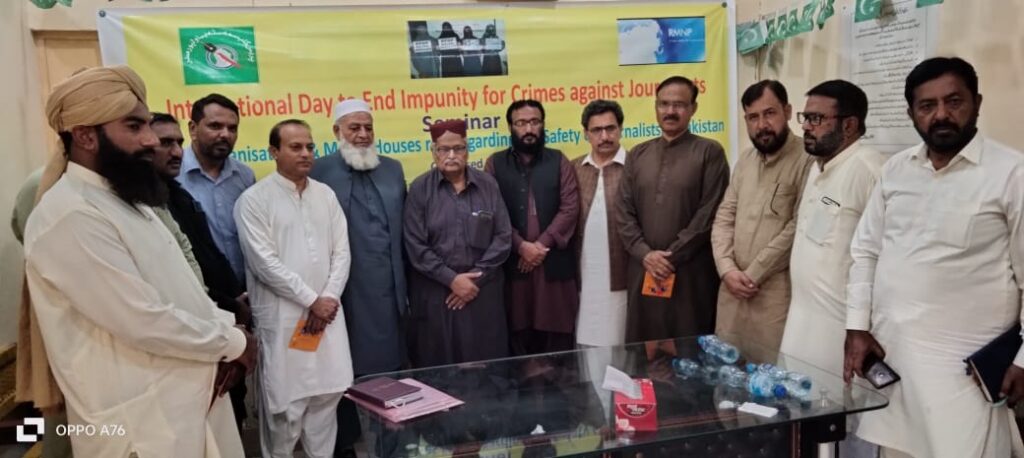
A group photo of speakers who addressed the RMNP seminar held on the occasion in International Day to End Impunity for Crimes against Journalists on 2nd November 2024 in town hall Samasata
Editor Daily Tabeer Bahawalpur Khalid Zameer while delivering speech stated that impunity for crimes against journalists —-especially the killing of journalists is a major threat to press freedom in Pakistan. No one has been held accountable in nearly nine out of ten cases where a journalist was killed. He said that still local media rely heavily on government advertisements but recently Punjab government amended its PEPRA rules quietly so all the local newspapers in South Punjab are facing severe financial crisis. He demanded of Chief Minister Punjab to withdraw this amendment otherwise local media outlets will be forced to close. Mr Zameer cited the examples of Canada, United States and Europe where local media outlets are being financially supported but here, we also need financial support for digital transformation of our media outlets for sustainability.
Member Federal Executive Council Pakistan Federal Union of Journalists (PFUJ) Riaz Ahmed Baloch said that persistence of impunity for crimes against journalists has far-reaching consequences. It erodes public trust in judicial systems and undermines the rule of law. The chilling effect of this impunity stifles investigative reporting which is vital to the health of democracy. The fact that so many crimes against journalists go unsolved, that so many perpetrators walk free, is a damning indictment of our global commitment to media freedom. To all the journalists out there, working in dangerous conditions, facing threats and intimidation: you are not forgotten. Your courage inspires us all, and to those we have lost, your sacrifice will not be in vain.
Editor monthly magazine TafheemulIslam Hameedullah Khan Aziz declared that “impunity recognizes no boundaries” the alarming pattern of attacks against journalists, without successful investigations or convictions, points towards shrinking freedom of expression in Pakistan. Reporters in rural areas and vernacular media appear particularly vulnerable to arbitrariness and threatening conduct. He said that during current year journalists who killed in the line of duty in Pakistan hail from small towns and districts while Pakistani media is urban oriented Aziz also highlighted the plight of rural journalists and said both media houses and media organizations are neglecting them despite the mushroom growth of newspapers, independent TV channels and FM radio stations. He cited the examples of several breaking news released by the rural journalists which caught headlines in national and international media.

RMNP President Ehsan Ahmed Sehar,Riaz Baloch,Khalid Zameer,Iftikhar Alvi,Farooq Babras,Syed Waqar Shah,Hameedullah Aziz, Shahid Ali,Tariq Malik and others address the RMNP seminar to celebrate” International Day to End Impunity for Crimes against Journalists” held in town hall Samasata on 2nd November 2024.
Editor Daily Urdu newspaper BBC Muhammad Naeem Abbasi said that the national and international political situation is always so volatile that the journalists’ safety is a central concern in rural Pakistan where more than sixty five percent country population is living. Pakistan media is forced to cover extremely dangerous assignments while the media houses are incapable of securing the lives of journalists, which is why Pakistani reporters have learnt to count on only themselves. In major cities big media houses can address the problems faced by journalists, but reporters in rural areas must fend for themselves as the government is unable to support journalists when the residents themselves are unforthcoming. It is very difficult for journalists to cover a war that is taking place in an area where they live. Therefore, much bomb explosions incidents in Balochistan and Fata are being monitored from Islamabad, it is also very difficult for journalists to leave their families behind while taking on dangerous assignments. Another area which requires joint efforts is impunity. Every time a journalist is killed, or a media house is attacked, the government announces that it will hold an inquiry. But the reports of these inquiries are never made public. People of Pakistan have a right to know what is happening within the corridors of power. To stem the culture of impunity, it is important that these violations be made public in the country where they occur, across the region and on a global scale, to put pressure on the local authorities to bring to justice the perpetrators and ensure that such actions are not repeated, he concluded.
Patron-in-Chief Samasata Press Club Iftikhar Ahmed Alvi thanked RMNP for organizing two journalists safety training workshops in collaboration with UNESCO and Doha Centre for Media Freedom for both male journalists and female contributors in 2015 and 2018 respectively at Samasata. Talking about the plight of the district correspondents, he said that historically, the growth and development of media in Pakistan has been in the main metropolitan centers. This phenomenon is not unique to Pakistan. However, what is perhaps different in the Pakistan context, and in fact in most developing economies, is that this growth has remained confined to the urban centers and has not filtered down to the districts. The district correspondent thus remains neglected, often working in isolation and with very little support from his organization whether financial, moral or professional. District correspondents are often poorly educated and grossly unpaid–or even unpaid—journalists who cannot rely on journalism for their sustenance. In the cities newcomers learn from senior colleagues but in rural areas correspondents generally work alone and do not get on the job training. Religious extremists force journalists to cover their speeches and pressurize them to publish their news word by word. Mr Alvi said that in South Punjab, journalists are being targeted by corrupt politicians and officers, landlords besides religious extremists. Unfortunately, media houses and media organizations usually avoided to support them and, in several incidents, even media houses expelled their own correspondents to please the complainant corrupt officials and influential politicians.
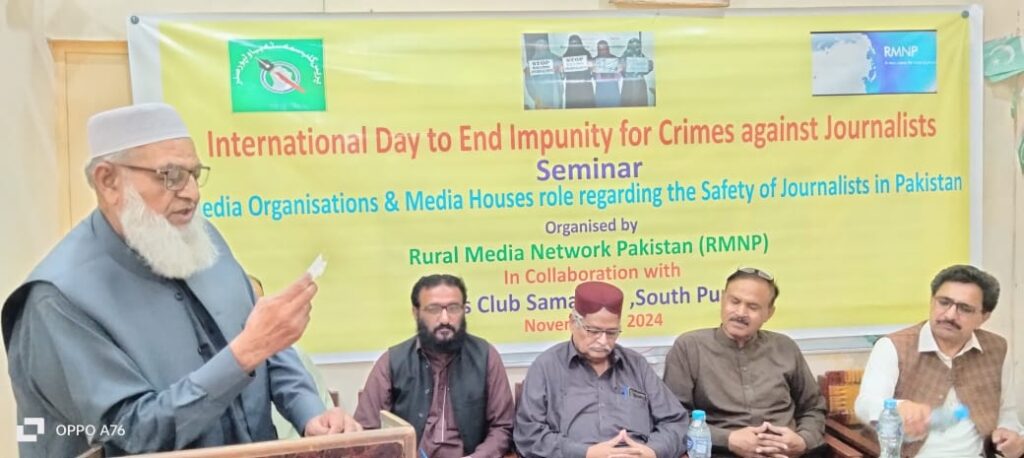
Coordinator RMNP & Patron-in-Chief Press Club Samasata Iftikhar Ahmed Alvi highlighting the RMNP previous activities regarding the safety of Journalists held in Samasata,South Punjab.
President Press Club Shahid Ali, General Secretary Tariq Malik Arain, Abdul Rehman Nasar, M. Arshad Anjum and Malik Siraj Missan while addressing the seminar condemned the multiple acts of violence, harassment, and detention of journalists while covering political protests by the opposition political party, the Pakistan Tehreek-e-Insaf (PTI). The recurring mistreatment of media professionals during politically charged events highlights an alarming trend where both law enforcement and political party members have disregarded press freedom and the role that media plays in covering key developments. This ongoing violation of journalists’ rights to work without intimidation or harm is unacceptable, and they demanded that those responsible be held accountable. Moreover, several participants shared stories of violence and harassment, highlighting the dire state of press freedom in Pakistan.

Press Club Samasata members receiving UNESCO Resource Material for the Safety of Journalists in the seminar held on 2nd November 2024 in town hall Samasata,South Punjab
Participants of the RMNP IDEI seminar adopted a resolution demanding Premier Shahbaz Sharif for swift implementation of the Protection of Journalists and Media Professionals, as required under the 2021 Act. Participants expressed disappointment over the government’s three years delay in forming the safety commission They said that the lack of a safety commission is a serious gap. We cannot keep delaying the protection as journalists feel themselves unsafe in prevailing environment.
Participants observed one minute silence in remembrance of the David Page a media rights champion and staunch supporter of press freedom. He was senior fellow of the Institute for Commonwealth Studies, former editor and manager in the BBC South Asian Services, and a driving force of the Commonwealth Journalists Association, died aged 80 on October 10 in London. His work on Commonwealth Media Principles was exemplary and he kept it for years.
Participants also condemned Israeli bombardment in Ghaza and Lebanon in which more than one hundred fifty journalists lost their lives while Palestinian media facilities and equipment were systematically destroyed. Participants offered Fateha for the departed souls of the all Muslim journalists
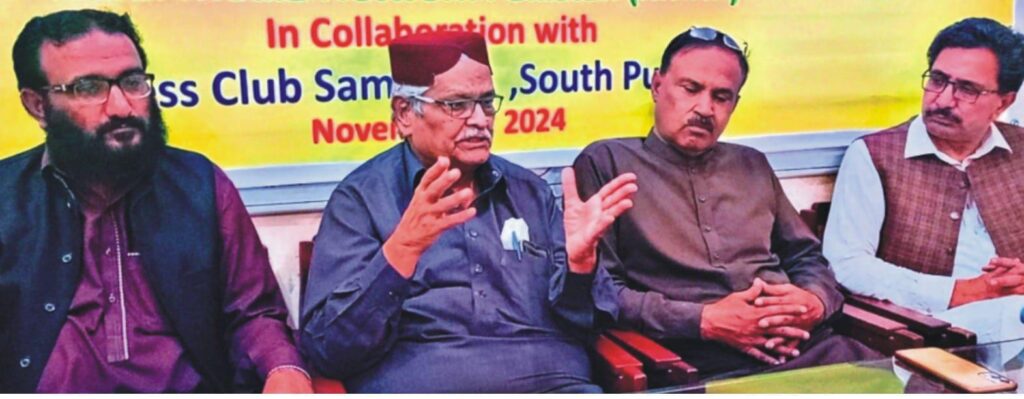
RMNP President Ehsan Ahmed Sehar paying rich tribute to Mr David Page rights champion of the Commonwealth who passed away on October 10 in London.He also condemned of the killing more than 150 journalists in Ghaza and Lebanon.
Later on Riaz Ahmed Baloch and Khalid Zameer delivered UNESCO Resource Material CDs for Journalist in Conflict among Press Club Samasata twenty members including Iftikhar Ahmed Alvi, Shahid Ali, Abdul Rehman Nasar, Malik Tariq Arain, Naeem Abbasi, Farooq Babrus and others on the behalf the Rural Media Network Pakistan.

